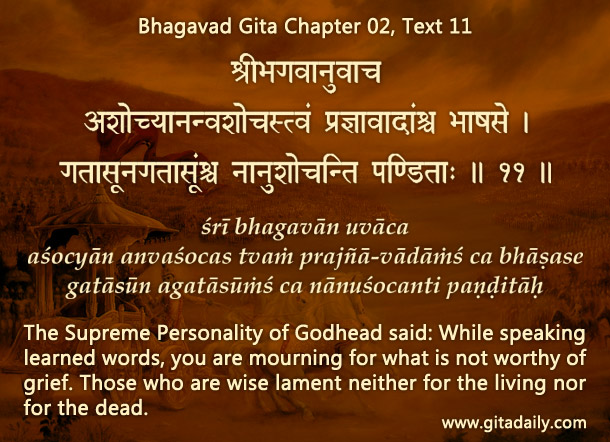Krishna begins his instruction to Arjuna with a reproach: Though you speak learned words, you lament for that which is not worthy of lamentation (Bhagavad-gita 02.11).
What does this reproach mean? To understand, let’s consider two key terms: learned words (prajna-vadams) and unworthy of lamentation (ashochyan).
Learned words: Generically, this could refer to Arjuna’s arguments for not fighting mentioned in the Gita’s first chapter (01.27-46). Specifically, it could refer to Arjuna’s assertion about what he has heard from the wise: those who destroy dynasties by killing the protectors of society will suffer in hell (01.43). Arjuna implies that if he fights in the war to kill his relatives who are protectors of their dynasty, he too will be hellbound.
Unworthy of lamentation: Krishna refers here to Arjuna’s tears at the prospect of the death of his venerable elders such as Bhishma and Drona. Why is their death not worth lamenting? Because they are souls, and death will free them from their present bodies to go to a better place.
In the subsequent verses, Krishna highlights that the soul is radically different from the body (02.11-30). Whereas Arjuna is worried about killing his elders’ bodies, Krishna shifts Arjuna’s focus to their souls — he will be freeing their indestructible souls from their present ethical entrapments which have obliged them to fight on the wrong side. Moreover, because they have an overall virtuous disposition and have acted virtuously most of their life, they as souls will be promoted to a better place in their afterlife.
Additionally when Arjuna cultivates spiritual awareness and purposefulness while doing his difficult duty as a martial guardian of society, he too will be spiritually elevated.
One-sentence summary
Though Arjuna speaks about the afterlife, he laments about doing a duty that will facilitate a good afterlife for his loved ones and for him too — hence Krishna’s reproach.
Think it over:
- What does Krishna refer to as learned words? What’s wrong with Arjuna’s learned words?
- What does Krishna consider unworthy of lamentation? Why?
- How does Krishna change Arjuna’s vision of the impending war?
***
02.11: The Supreme Personality of Godhead said: While speaking learned words, you are mourning for what is not worthy of grief. Those who are wise lament neither for the living nor for the dead.
To know more about this verse, please click on the image


…Arjuna argued that religious principles should be given more importance than politics or sociology, but he did not know that knowledge of matter, soul and the Supreme is even more important than religious formularies. And because he was lacking in that knowledge, he should not have posed himself as a very learned man. As he did not happen to be a very learned man, he was consequently lamenting for something which was unworthy of lamentation. The body is born and is destined to be vanquished today or tomorrow; therefore the body is not as important as the soul. One who knows this is actually learned, and for him there is no cause for lamentation, regardless of the condition of the material body.
We are all going to leave one day, what matters are the deeds.